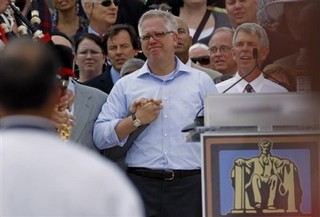Ever since learning that Glenn Beck had joined the Mormon Church, I’ve been trying to understand who he is, what he does, and how his conversion to Mormonism has influenced him personally and professionally. Beck is an enigma, a chameleon, a shape-shifter, continually reinventing himself. He has gone from “zoo radio”cut-up, to stand-up comedian, to political commentator/entertainer, to Fox News firebrand, to cheerleader of a populist anti-government movement, to a modern-day Cassandra prophesying doom and destruction for a nation allegedly in the thrall of progressivism. A Latter-day Saint friend of mine calls him “a cross between a professional wrestler and a televangelist,” and some critics see him as the Barnum and Bailey of right-wing broadcast media. Conservative commentator Mark Levin remarked recently, “I have no idea what philosophy Glenn Beck is promoting. And neither does he. It’s incoherent. One day it’s populist, the next it’s libertarian bordering on anarchy, next it’s conservative but not really.”3 Senator Robert Byrd’s recent characterization of certain Republican politicians’ “rantings” as “barkings from the nether regions of Glennbeckistan”4 suggests the extent to which Beck’s notoriety has become a part of popular culture.
Glenn Beck: Rough Stone Roaring

Read Full Article »
Comment



